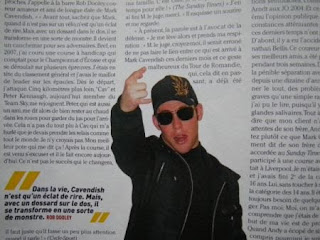With France’s soccer team behaving like spoilt brats, the media are going to town on the story of the team’s implosion, the massive egos and the management blunders.
Gawking at this, one comment stood out: the French football federation, FFF, had commissioned research and polling in recent years and the team was seen as aloof, arrogant and increasingly detached from the French public. Bizarrely the FFF thought the solution for the World Cup was to isolate the French team in a plush hotel, to shield them from angry fans and probing journalists. Rather than fixing the problem, the FFF thought keeping the team away from critics would stop the group from being destabilised.
I would have gone the other way, using the research to make the players get out more and meet the public. Even thinking cynically, there valuable marketing opportunities for sponsors when players kick a ball in a school or with factory workers.
A reputation can be hard to lose
Back to cycling and one rider in particular: Mark Cavendish. He’s had a tough start to the year, with dental problems and a comeback hampered by outrage and accident. Even before his crash in the Tour of Switzerland something was happening, his reputation was becoming increasingly negative. France’s Vélo magazine asked aloud whether he was a “the hooligan of peloton”.
Like the French soccer players, Cavendish needs to realise that a rider’s image is distinct from his palmarès. It’s fine to be the most prolific winner but riders are firstly paid to project an image. Even if you don’t want to, sometimes you need to work on your public image. In sport winning normally coincides with the image desired: success, teamwork, speed and youth are potent symbols for marketing. But winning is not everything, crossing the line first is a great success and honour but you can quickly ruin it with a cheap quote or a rude gesture.
Just as the French soccer team has an image, almost a brand, so Cavendish too has a public perception. It’s no good firing off jokey quotes, only to apologise for them later: the quote makes the front page, the apology is a byline.
If this goes on, I fear the rider could possibly become a liability for his team. They have riders like Matt Goss, Leigh Howard and, for now at least, Andre Greipel. Fewer wins, but conducted with better professionalism, would mean more for the sponsors.
Within reason
Now a bit of character’s great. I’ve got plenty of time for Cav and like a rider who speaks out and says what’s on his mind. After a six hour race it can be hard to talk coherently, yet alone say anything interesting. So a lively personality and a loud-mouth style can be fine. It’s just that there’s a limit, you can quickly go from amusing to outrageous, outspoken to rude. It’s not that we know the real man, it’s more a question of a media image getting ahead of reality.
In the bunch
One more thing: Cavendish is not always popular rider in the bunch. Cavendish is an influential figure: his earnings are stellar and race organisers and the highest staff at the UCI talk to him – a privilege afforded to few riders.
I was talking to a rider the other day who is a lead out specialist for a rival team. He was jubilant at Cavendish’s misfortunes this year. Not in a mean way at all, and not even because his team’s chances of winning were greater. No, simply because a lot of riders feel Cavendish’s mouth is too big and that he needs to chomp on some humble pie. Again, a reputation can precede you.


